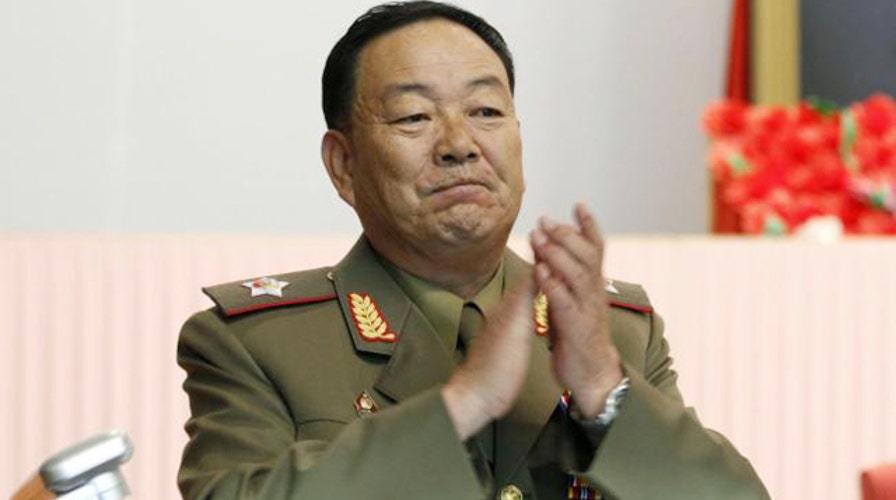Report: North Korean defense minister brutally executed
South Korea's spy agency says he was killed by anti-aircraft gun at shooting range in front of hundreds of people for sleeping during meeting
South Korea's spy agency told the country's lawmakers Wednesday that North Korean dictator Kim Jong Un executed his defense chief for falling asleep during a meeting and talking back to the young leader.
Lawmaker Shin Kyoung-min says that officials from the National Intelligence Service told a closed-door parliamentary committee that People's Armed Forces Minister Hyon Yong Chol was killed by anti-aircraft gunfire with hundreds watching at a shooting range at Pyongyang's Kang Kon Military Academy in late April. Shin was one of the lawmakers who attended the briefing.
The office of another lawmaker, Lee Cheol Woo, released similar information about the NIS briefing.
The NIS didn't tell lawmakers how it got the information, saying only that it was from a variety of channels and that it believed it to be true, Shin said. The agency wouldn't comment when contacted by The Associated Press. South Korea's spy agency has a spotty record of tracking developments in North Korea. Information about the secretive, authoritarian state is often impossible to confirm.
U.S. State Department spokesman Jeff Rathke said Wednesday the U.S. can't confirm reporting of the execution of North Korean officials, but added that "these disturbing reports, if they are true, describe another extremely brutal act by the North Korean regime. These reports are sadly not the first."
Analyst Cheong Seong-chang at the private Sejong Institute think tank in South Korea questioned the authenticity of the report on Hyon's execution because the minister still frequently appears in state TV footage.
North Korea typically removes executed and purged officials from TV documentaries, but Hyon has appeared multiple times in a TV documentary on live fire drills between April 30 and May 11, according to Seoul's Unification Ministry. North Korea's state media hasn't mentioned Hyon since an April 29 report of his attendance of a music performance the previous day.
Hyon was named armed forces minister, the equivalent of South Korea's defense minister, in June of last year. He was made a vice marshal of the Korean People's Army in July 2012 before being demoted to a four-star general later that year, according to South Korea's Unification Ministry. Kim, the South Korean parliament's intelligence committee chief, said Hyon was the North Korean military's No. 2 after Hwang Pyong So, the top political officer at the Korean People's Army.
Since taking power upon the death of his dictator father in late 2011, Kim has orchestrated a series of purges in apparent efforts to bolster his grip on power. Analysts are split on whether the bloody power shifts indicate a young leader in firm control, or someone still struggling to establish himself. The most notable purge was in 2013 when Kim executed his uncle and chief deputy, Jang Song Thaek, for alleged treason.
Koh Yu-hwan, a North Korea expert at Dongguk University in Seoul, said Kim Jong Un appears to be using purges to keep the military old guard in check as they pose the only plausible threats to his rule. Koh said Kim could be resorting to a "reign of terror" to solidify his leadership but that would eventually have only a limited effect if he fails to produce breakthroughs in resolving the country's economic woes.
Last month, spy officials told lawmakers that North Korea executed 15 senior officials accused of challenging Kim's authority.
The Associated Press contributed to this report.

